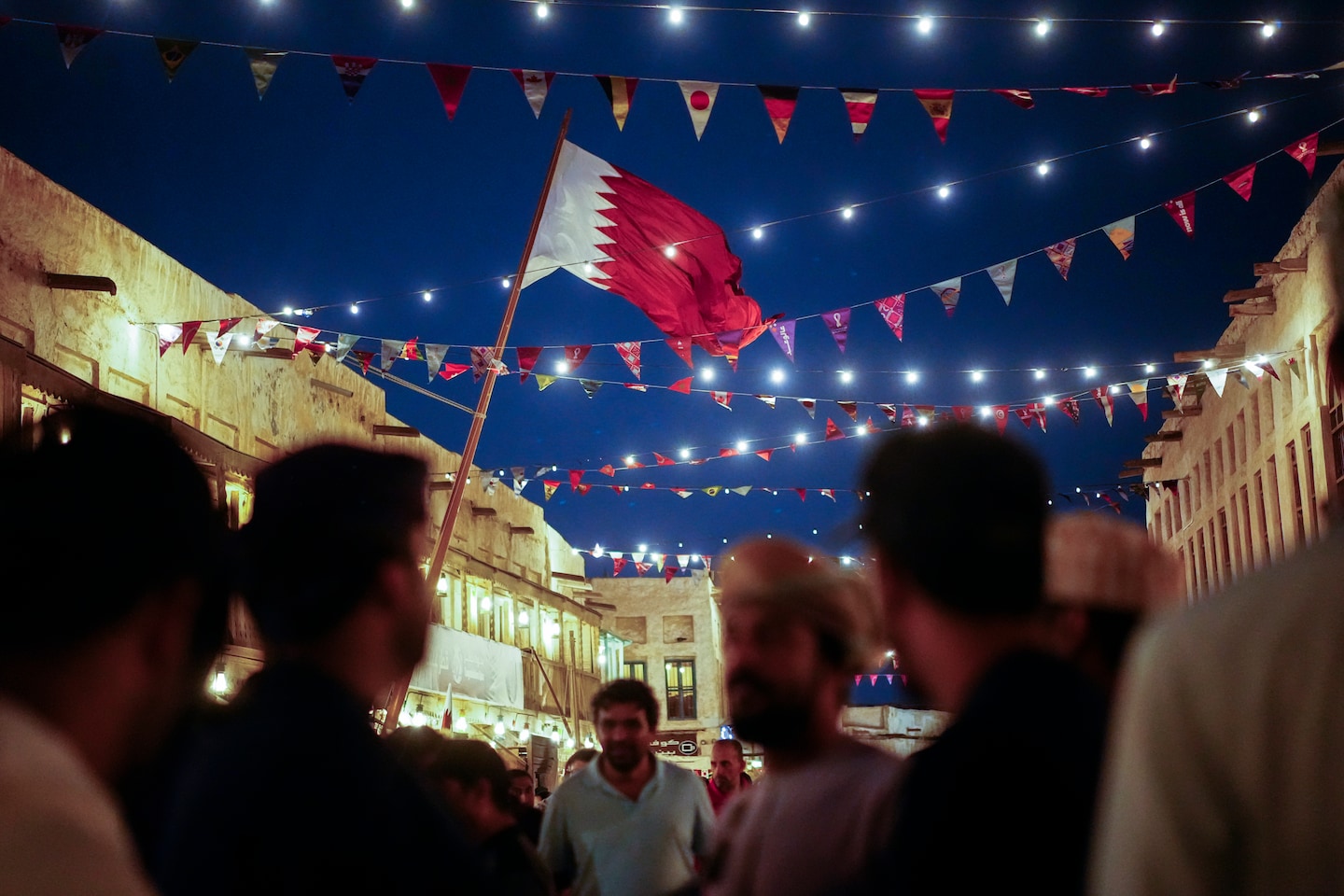DOHA, Qatar — Toward the end of last week, before leaving the Qatari capital, Today’s WorldView sat down with the country’s top diplomat. In the minds of many critics, especially in the West, Qatar’s World Cup will always be a tournament shrouded in controversy. Allegations of labor abuses and shoddy support for human rights have followed Qatar ever since it won the bid in 2010 to host the event. Rights groups and journalists tried to count the dead as hundreds of thousands of migrant workers were enlisted in a mammoth nationwide construction project.
But Qatar’s foreign minister, Mohammed bin Abdulrahman Al-Thani, wants people to take another view. He pointed to the joyous scenes of fans celebrating together in Doha, the happy regional vibes fostered by the Middle East’s World Cup, and the genuine labor reforms pushed through by the Qatari government over the past decade.
A portion of our Thursday evening conversation with the foreign minister appears here. It has been edited for clarity and brevity.
Today’s WorldView: The World Cup began amid a lot of criticism and acrimony. Now that we’re nearing the last week of the tournament, how do you feel about where things stand?
Al-Thani: We believe that we are subject to something unprecedented. Some previous World Cups have been attacked or not especially praised. But this situation, especially given the long period since the award [of the World Cup bid to Qatar in 2010] and also the attitude and the behavior of some media toward Qatar was quite negative and disappointing from our perspective. They were trying to judge Qatar not based on facts, or not based on coming here and fact-checking.
We believe that this is the most inclusive World Cup. There are a lot of people from different countries, from different backgrounds who have never been able to come and enjoy the World Cup. If you look at the demography of the fans, Indian fans are there, fans from Pakistan, from Southeast Asia, from the Far East, from the Arab region, from Europe, from Latin America, from Central Asia. All of them, they are coming here and enjoying the football.
Think about the uniqueness of this tournament in a very small country the size of Connecticut. People can go and attend four games in one day. And this made the World Cup affordable for a lot of people who never dreamed about coming to football, let alone attending multiple matches.
Honestly, the best reward for us in Qatar is the way the fans have enjoyed this tournament. We are seeing, whether on social media or in some media outlets that are trying to report impartially, most of the visitors are having a very positive experience. I am sure there are maybe some negative observations here or there. But most of them are talking about how hospitable this country is and the people of this country are. How kind they are. And this is something that we are proud of. We want to show to the world that Arab countries, the Middle Eastern region, are not only about wars and conflicts. It’s also about celebration and celebration of this beautiful game.
There is, of course, substance to the criticism. Surely you recognize the concerns that many outside Qatar have about worker rights and abuses that potentially surrounded the World Cup?
We never claim that our country is perfect. We never claimed that the conditions of the migrant laborers are perfect. Once these concerns were highlighted, Qatar has acknowledged them and taken them seriously. All the reforms throughout the last 12 years that Qatar took on have been implemented. It’s been pictured in a way that Qatar is just ignoring the fact that there is an issue, which is not the case.
In fact, since the past eight years, we brought a group of independent lawyers to examine our labor situation and to identify for us the gaps and loopholes, whether in our legislation or in the system that we have here. And we took the report very seriously. We had 120 recommendations at that time. A lot of these recommendations were to be dealt with at the source countries of the migrant laborers. And part of it was the responsibility of the government of Qatar.
We opened our doors for the NGOs. There is no country in the region that adopts an open-door policy, like what Qatar did. Organizations like Human Rights Watch or Amnesty International, they can come here, they can publish their reports here. They cannot do it in some other places.
We set an example in this region, leading change, leading reforms. And unfortunately, despite all of this, some NGOs and media outlets were just trying to attack Qatar without acknowledging or appreciating all these developments that happened. It’s an achievement for a government system to change in 10 years. Europe didn’t change in 10 years. The United States didn’t change in 10 years. We have accelerated these changes. And we are also thankful for the World Cup that helped us in accelerating these kinds of changes.
But [critics] have been always pointing at the governments and the government’s responsibility. They never point at the companies. If there was a situation happening in Europe with migrant laborers being exploited, they would blame the company involved, never the government.
Part of the scrutiny has come from a sense of confusion about statistics. For migrant worker death tolls, we are given data by the Supreme Committee (the Qatari agency created to run the World Cup) that doesn’t seem to reflect the full picture in Qatar.
If you look at our statistics, we have the death rates published every year. It’s based on nationality. We don’t categorize by jobs. But this is the classification that we’ve been using. And this is a department that’s been established only a few years ago. We cannot expect from them to have an expertise and publish everything with all the details. And this is a journey that will need time.
With the Supreme Committee … they are publishing their data. Considering the workers who died in World Cup sites, one death is too many. But for the entire period [of preparation for the World Cup], there were three [deaths]. And this is what has been said and repeated many times.
But [our critics] don’t want to listen to the other side. That’s our problem. … There is a consistency in just attacking the country.
You spoke earlier of inclusion at the World Cup. But there has been a lot of questions around the ability of LGBTQ people and those who support them to participate here in Qatar.
We’ve been saying repeatedly, “everybody is welcome.” What we’ve been asking is for the visitors who are visiting us to come here to enjoy the football, focus on the football, enjoy our culture, enjoy the country and the hospitality of the country. Just respect the laws, which is something that is expected of Qataris when they are traveling in other countries. Respect our laws and our traditions.
We’ve been very clear: It’s not our business what is the background of the people who are coming. Our business is whatever … is affecting the public safety or trying by any means to offend the public. This is not acceptable. And this is applied to a LGBT couple or to a man and woman. It’s not something that’s pointed or directed toward one orientation or another. We’ve been saying that public display of affection is not allowed in Qatar. And this is applied to everyone.
The issue is about public display of symbols, not affection. Why were people with rainbow flags stopped at stadiums?
Whatever is happening on the pitch, this is FIFA rules, not Qatar rules. Whatever is happening outside the pitch is our rules.
What will the legacy of this World Cup be for your country and this region?
The World Cup is just a start. It’s not the end of the story. First of all, we’ve delivered something historic — having all these people coming here and experiencing the Middle East. We are 100 percent certain that it will help a lot in changing the perception of a lot of people around the world about the region. Second, all this infrastructure Qatar had planned back even before the bid, as part of our National Vision 2030. And the World Cup helped in accelerating this to be delivered and to be achieved. It’s going to continue to serve this vision for economic diversification and for our tourism sector continuing to flourish.
Have you been struck by the Pan-Arab solidarity on show in Qatar and across the region in support of Morocco, in particular, as it makes its historic run?
This is something that makes us very proud, that Qatar, this small country, was able to bring all the Arabs back together. And this is the beauty and the magic of the game itself, how it brings people from different backgrounds, Arabs and non-Arabs, everyone from everywhere, together. You can never see this happening in the West, but you see it happen here because there’s a common denominator bringing us all together — we believe that all of us belong to each other. What you have seen here in Qatar, the way that the people and the fans blended together, it’s really something fascinating that I don’t think that we have ever seen before. And maybe we will never be able to see it again.
On the sidelines of the tournament, we’ve seen major meetings between your emir and leaders of Saudi Arabia, Egypt and the United Arab Emirates. Is the World Cup a turning point for your country after the long boycott and blockade it experienced at the hands of some of your neighbors?
Given the crisis that we’ve been through, we believe that what should bring us together is much more important than what should separate us. We believe in the unity of the [Gulf Cooperation Council, a bloc of six Arab monarchies in the region]. This doesn’t mean that we will agree on everything. We have differences. Let us build on what we have as a common objective. We cannot restore everything. We know that will take time. But we see a leadership willingness to bring back the relationship where it should be.
We also understand that we are connected, despite disagreements in some policies, that … it’s better to elevate ourselves above our differences and focus on the challenges that come. We see the world is polarizing. We see the impact of the Russian war with Ukraine. We see the impact of covid. And we see that all these global crises that are happening around us is affecting us either directly or indirectly. And if we are not going to work together building our integrated systems and integrated resilience, we will never be able to survive such challenges.
There is a perception that part of what provoked the dispute is Qatar’s independent streak in foreign policy and its support over the years for certain actors, specifically political Islamist parties like the Muslim Brotherhood. Is that a fair perception?
The first half of the perception is the truth: We agree on some policies and we disagree on some policies, given our assessments and given their assessment. What we’ve been saying that whatever we agree on, let us work together — and whatever we disagree on, let us agree that we disagree. And we respect this disagreement.
But there is this misperception, which is the second half of the question, that Qatar is picking actors in the region to stand for something. This was never the case for Qatar. We are not taking the side of political Islam or the side of liberal parties versus secular parties. It’s not our business. We are a state. We are not a political party.
Maybe we took certain steps, certain policies when the Arab Spring started [to back elements of pro-democracy uprisings in parts of the Arab world in 2011]. But those steps were not taken until we have seen the people of those countries either bombed or victim to massacres. That is when we acted collectively, maybe not with the GCC, but with other countries.



